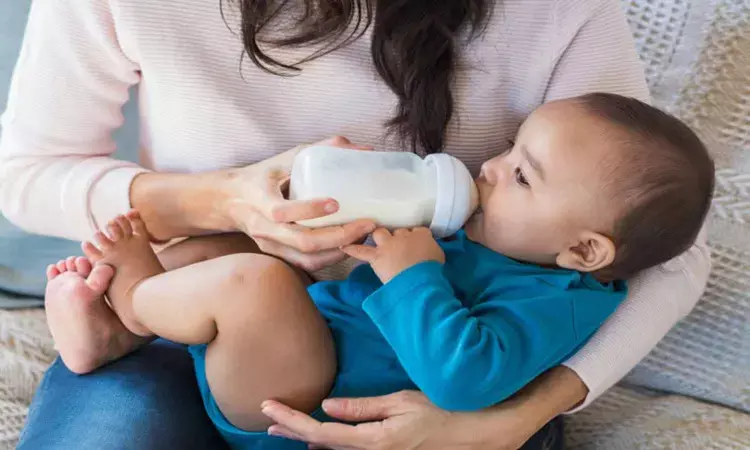- Home
- Medical news & Guidelines
- Anesthesiology
- Cardiology and CTVS
- Critical Care
- Dentistry
- Dermatology
- Diabetes and Endocrinology
- ENT
- Gastroenterology
- Medicine
- Nephrology
- Neurology
- Obstretics-Gynaecology
- Oncology
- Ophthalmology
- Orthopaedics
- Pediatrics-Neonatology
- Psychiatry
- Pulmonology
- Radiology
- Surgery
- Urology
- Laboratory Medicine
- Diet
- Nursing
- Paramedical
- Physiotherapy
- Health news
- Fact Check
- Bone Health Fact Check
- Brain Health Fact Check
- Cancer Related Fact Check
- Child Care Fact Check
- Dental and oral health fact check
- Diabetes and metabolic health fact check
- Diet and Nutrition Fact Check
- Eye and ENT Care Fact Check
- Fitness fact check
- Gut health fact check
- Heart health fact check
- Kidney health fact check
- Medical education fact check
- Men's health fact check
- Respiratory fact check
- Skin and hair care fact check
- Vaccine and Immunization fact check
- Women's health fact check
- AYUSH
- State News
- Andaman and Nicobar Islands
- Andhra Pradesh
- Arunachal Pradesh
- Assam
- Bihar
- Chandigarh
- Chattisgarh
- Dadra and Nagar Haveli
- Daman and Diu
- Delhi
- Goa
- Gujarat
- Haryana
- Himachal Pradesh
- Jammu & Kashmir
- Jharkhand
- Karnataka
- Kerala
- Ladakh
- Lakshadweep
- Madhya Pradesh
- Maharashtra
- Manipur
- Meghalaya
- Mizoram
- Nagaland
- Odisha
- Puducherry
- Punjab
- Rajasthan
- Sikkim
- Tamil Nadu
- Telangana
- Tripura
- Uttar Pradesh
- Uttrakhand
- West Bengal
- Medical Education
- Industry
Birth during COVID-19 pandemic may negatively impact neurodevelopment in infants: JAMA

New York, New York: Lauren C. Shuffrey and colleagues published new research in which they discovered that birth during the pandemic, but not in utero exposure to maternal SARS-CoV-2 infection, was related to abnormalities in neurodevelopment at 6 months. The findings of this study, published in the journal JAMA Pediatrics support the need for long-term monitoring of children born during the COVID-19 pandemic.
There may be links between in utero exposure to mother SARS-CoV-2 infection and neurodevelopment, however, this is currently unclear. As a result, the purpose of this study was to look at the links between mother SARS-CoV-2 infection during pregnancy, being born during the COVID-19 pandemic regardless of maternal SARS-CoV-2 status, and neurodevelopment at 6 months.
The COVID-19 Mother Baby Outcomes Initiative at Columbia University Irving Medical Center in New York City included a cohort of newborns exposed to mother SARS-CoV-2 infection during pregnancy and unexposed controls. All women who gave birth at Columbia University Irving Medical Center while infected with SARS-CoV-2 during their pregnancy were contacted. Women with unexposed babies were addressed because they had a comparable gestational age at birth, date of birth, sex, and mode of delivery. At 6 months, neurodevelopment was examined using the Ages & Stages Questionnaire, 3rd Edition (ASQ-3). Secondary analyses included a historical group of babies born before the pandemic who had completed the 6-month ASQ-3.
Maternal SARS-CoV-2 infection during pregnancy and delivery during the COVID-19 pandemic was included in the study. The outcomes were scores on the five ASQ-3 subdomains, with the hypothesis being that maternal SARS-CoV-2 infection during pregnancy was related to delays in social and motor development at 6 months.
The key findings were:
1. 596 of the 1706 women contacted enrolled; 385 were invited to a 6-month assessment, with 272 (70.6%) completing the ASQ-3.
2. Data for 255 newborns recruited in the COVID-19 Mother Baby Outcomes Initiative were available.
3. Data from a historical group of 62 babies born prior to the epidemic were also available. Regardless of infection timing or intensity, in utero exposure to mother SARS-CoV-2 infection was not related with significant differences on any ASQ-3 subdomain.
4. In fully adjusted models, however, infants born during the pandemic had significantly lower scores on gross motor, fine motor, and personal-social subdomains when compared to the historical group.
In conclusion, the observed link between pandemic birth and neurodevelopmental state, regardless of mother SARS-CoV-2 status, suggests a possible mechanism involving maternal pandemic-related anxiety that merits further exploration.
Reference:
Shuffrey LC, Firestein MR, Kyle MH, et al. Association of Birth During the COVID-19 Pandemic With Neurodevelopmental Status at 6 Months in Infants With and Without In Utero Exposure to Maternal SARS-CoV-2 Infection. JAMA Pediatr. Published online January 04, 2022. doi:10.1001/jamapediatrics.2021.5563
Medical Dialogues consists of a team of passionate medical/scientific writers, led by doctors and healthcare researchers. Our team efforts to bring you updated and timely news about the important happenings of the medical and healthcare sector. Our editorial team can be reached at editorial@medicaldialogues.in.
Dr Kamal Kant Kohli-MBBS, DTCD- a chest specialist with more than 30 years of practice and a flair for writing clinical articles, Dr Kamal Kant Kohli joined Medical Dialogues as a Chief Editor of Medical News. Besides writing articles, as an editor, he proofreads and verifies all the medical content published on Medical Dialogues including those coming from journals, studies,medical conferences,guidelines etc. Email: drkohli@medicaldialogues.in. Contact no. 011-43720751


